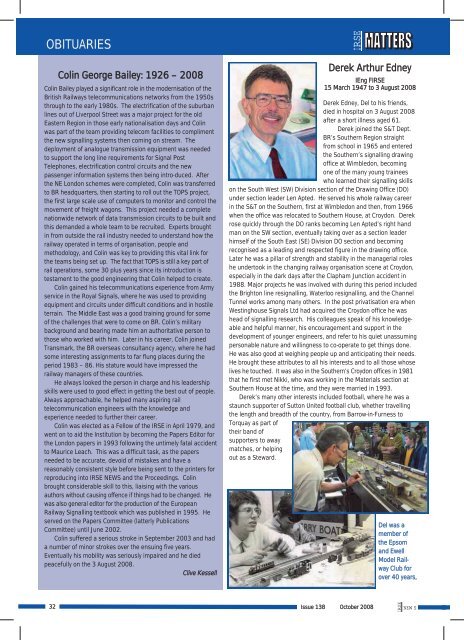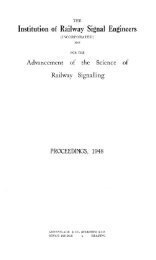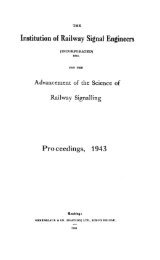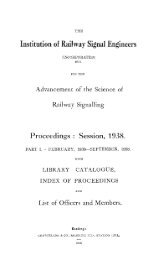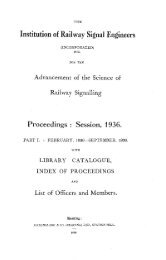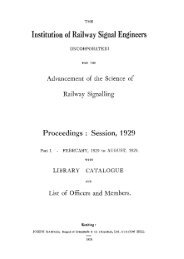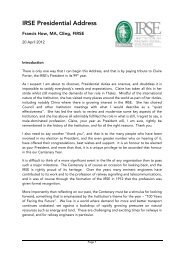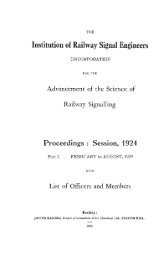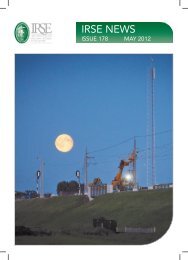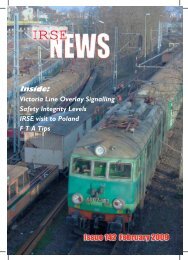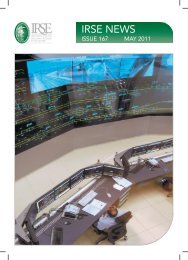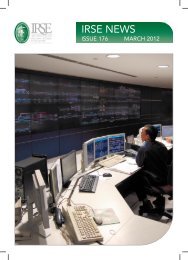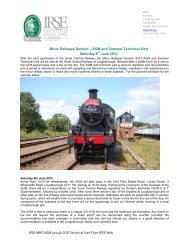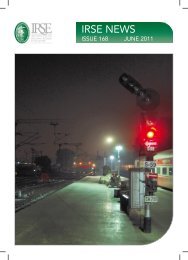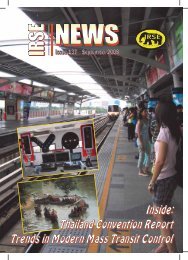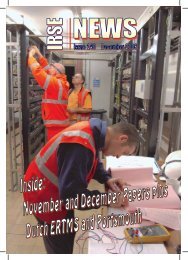IRSE News 138 Oct 08.pdf
IRSE News 138 Oct 08.pdf
IRSE News 138 Oct 08.pdf
Create successful ePaper yourself
Turn your PDF publications into a flip-book with our unique Google optimized e-Paper software.
OBITUARIES<br />
Colin George Bailey: 1926 – 2008<br />
Colin Bailey played a significant role in the modernisation of the<br />
British Railways telecommunications networks from the 1950s<br />
through to the early 1980s. The electrification of the suburban<br />
lines out of Liverpool Street was a major project for the old<br />
Eastern Region in those early nationalisation days and Colin<br />
was part of the team providing telecom facilities to compliment<br />
the new signalling systems then coming on stream. The<br />
deployment of analogue transmission equipment was needed<br />
to support the long line requirements for Signal Post<br />
Telephones, electrification control circuits and the new<br />
passenger information systems then being intro-duced. After<br />
the NE London schemes were completed, Colin was transferred<br />
to BR headquarters, then starting to roll out the TOPS project,<br />
the first large scale use of computers to monitor and control the<br />
movement of freight wagons. This project needed a complete<br />
nationwide network of data transmission circuits to be built and<br />
this demanded a whole team to be recruited. Experts brought<br />
in from outside the rail industry needed to understand how the<br />
railway operated in terms of organisation, people and<br />
methodology, and Colin was key to providing this vital link for<br />
the teams being set up. The fact that TOPS is still a key part of<br />
rail operations, some 30 plus years since its introduction is<br />
testament to the good engineering that Colin helped to create.<br />
Colin gained his telecommunications experience from Army<br />
service in the Royal Signals, where he was used to providing<br />
equipment and circuits under difficult conditions and in hostile<br />
terrain. The Middle East was a good training ground for some<br />
of the challenges that were to come on BR. Colin’s military<br />
background and bearing made him an authoritative person to<br />
those who worked with him. Later in his career, Colin joined<br />
Transmark, the BR overseas consultancy agency, where he had<br />
some interesting assignments to far flung places during the<br />
period 1983 – 86. His stature would have impressed the<br />
railway managers of these countries.<br />
He always looked the person in charge and his leadership<br />
skills were used to good effect in getting the best out of people.<br />
Always approachable, he helped many aspiring rail<br />
telecommunication engineers with the knowledge and<br />
experience needed to further their career.<br />
Colin was elected as a Fellow of the <strong>IRSE</strong> in April 1979, and<br />
went on to aid the Institution by becoming the Papers Editor for<br />
the London papers in 1993 following the untimely fatal accident<br />
to Maurice Leach. This was a difficult task, as the papers<br />
needed to be accurate, devoid of mistakes and have a<br />
reasonably consistent style before being sent to the printers for<br />
reproducing into <strong>IRSE</strong> NEWS and the Proceedings. Colin<br />
brought considerable skill to this, liaising with the various<br />
authors without causing offence if things had to be changed. He<br />
was also general editor for the production of the European<br />
Railway Signalling textbook which was published in 1995. He<br />
served on the Papers Committee (latterly Publications<br />
Committee) until June 2002.<br />
Colin suffered a serious stroke in September 2003 and had<br />
a number of minor strokes over the ensuing five years.<br />
Eventually his mobility was seriously impaired and he died<br />
peacefully on the 3 August 2008.<br />
Clive Kessell<br />
<strong>IRSE</strong><br />
Derek Arthur Edney<br />
IEng F<strong>IRSE</strong><br />
15 March 1947 to 3 August 2008<br />
Derek Edney, Del to his friends,<br />
died in hospital on 3 August 2008<br />
after a short illness aged 61.<br />
Derek joined the S&T Dept.<br />
BR’s Southern Region straight<br />
from school in 1965 and entered<br />
the Southern’s signalling drawing<br />
office at Wimbledon, becoming<br />
one of the many young trainees<br />
who learned their signalling skills<br />
on the South West (SW) Division section of the Drawing Office (DO)<br />
under section leader Len Apted. He served his whole railway career<br />
in the S&T on the Southern, first at Wimbledon and then, from 1966<br />
when the office was relocated to Southern House, at Croydon. Derek<br />
rose quickly through the DO ranks becoming Len Apted’s right hand<br />
man on the SW section, eventually taking over as a section leader<br />
himself of the South East (SE) Division DO section and becoming<br />
recognised as a leading and respected figure in the drawing office.<br />
Later he was a pillar of strength and stability in the managerial roles<br />
he undertook in the changing railway organisation scene at Croydon,<br />
especially in the dark days after the Clapham Junction accident in<br />
1988. Major projects he was involved with during this period included<br />
the Brighton line resignalling, Waterloo resignalling, and the Channel<br />
Tunnel works among many others. In the post privatisation era when<br />
Westinghouse Signals Ltd had acquired the Croydon office he was<br />
head of signalling research. His colleagues speak of his knowledgeable<br />
and helpful manner, his encouragement and support in the<br />
development of younger engineers, and refer to his quiet unassuming<br />
personable nature and willingness to co-operate to get things done.<br />
He was also good at weighing people up and anticipating their needs.<br />
He brought these attributes to all his interests and to all those whose<br />
lives he touched. It was also in the Southern’s Croydon offices in 1981<br />
that he first met Nikki, who was working in the Materials section at<br />
Southern House at the time, and they were married in 1993.<br />
Derek’s many other interests included football, where he was a<br />
staunch supporter of Sutton United football club, whether travelling<br />
the length and breadth of the country, from Barrow-in-Furness to<br />
Torquay as part of<br />
their band of<br />
supporters to away<br />
matches, or helping<br />
out as a Steward.<br />
Del was a<br />
member of<br />
the Epsom<br />
and Ewell<br />
Model Railway<br />
Club for<br />
over 40 years,<br />
32<br />
Issue <strong>138</strong> <strong>Oct</strong>ober 2008<br />
<strong>IRSE</strong><br />
NEWS


